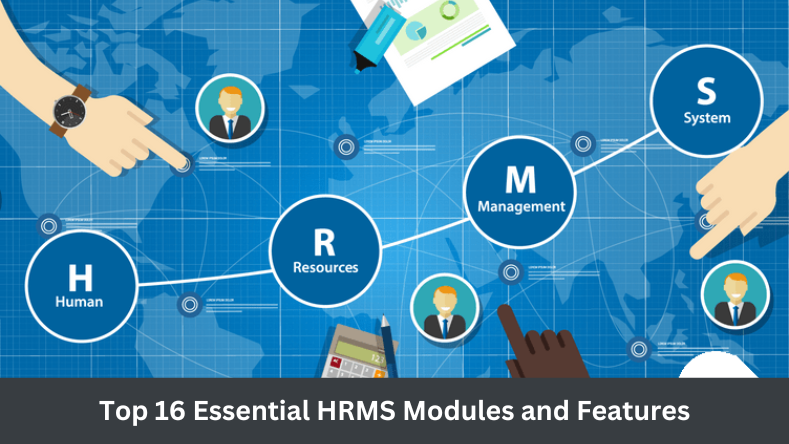A Human Resource Management System (HRMS) is designed to streamline and automate HR processes, making it easier for businesses to manage their employees effectively. With various modules available, companies can tailor HRMS solutions to meet their specific needs. Below, we’ll explore 16 essential HRMS modules and features that help businesses optimize their HR functions.
1. Employee Information Management
This module stores and manages all employee-related data, including personal details, employment history, skills, and certifications, in a centralized database.
2. Payroll Management
Automating payroll processing is crucial for accurate salary calculations, tax deductions, and benefits distribution. It ensures timely payments and reduces errors in payroll administration.
3. Recruitment and Onboarding
This feature manages job postings, tracks applications, and handles interviews. It also helps with onboarding new employees, ensuring they have the resources and documentation needed to begin work smoothly.
4. Time and Attendance Tracking
The time and attendance module tracks employee hours, including leave requests, overtime, and shifts. It ensures accurate timekeeping and helps with scheduling and workforce management.
5. Benefits Administration
This module manages employee benefits like health insurance, retirement plans, and other perks, making it easy for HR departments to track and update employee benefits packages.
6. Performance Management
Performance management tools help companies monitor and evaluate employee performance through goals, reviews, and feedback. This module often integrates with other systems to provide a holistic view of employee productivity.
7. Learning and Development
Also known as a training module, this feature helps manage employee training programs, courses, certifications, and progress tracking, ensuring employees’ professional development.
8. Employee Self-Service
An employee self-service portal allows employees to view their own HR-related information, such as payslips, benefits, and time-off requests, reducing the administrative burden on HR staff.
9. Compliance Management
This module helps companies stay compliant with labor laws and regulations by automating compliance reporting and alerting businesses to legal updates, reducing the risk of non-compliance.
10. Leave Management
Leave management tracks employee time off, including vacation, sick leave, and other absences. It ensures transparency and helps managers plan work schedules more efficiently.
11. Expense Management
This feature allows employees to submit expense claims, and managers to approve or reject them. It tracks all business expenses, ensuring proper financial record-keeping and reimbursement.
12. HR Analytics and Reporting
HR analytics provides actionable insights through data analysis. It helps HR teams make informed decisions by generating reports on employee turnover, performance, and workforce productivity.
13. Document Management
This module helps HR departments store and organize employee documents, such as contracts, agreements, and other important files, in one secure, centralized system.
14. Succession Planning
Succession planning tools help identify and prepare future leaders within the organization by tracking employee development, leadership potential, and readiness for advancement.
15. Compensation Management
This module helps HR teams manage and adjust employee salaries, bonuses, and raises. It ensures that compensation strategies are fair and in line with industry standards.
16. Collaboration Tools
Collaboration tools integrated into an HRMS allow employees and teams to communicate easily, share files, and collaborate on projects, fostering better teamwork and engagement.
Conclusion
An HRMS is a powerful tool for businesses to streamline and automate HR tasks. By implementing these essential modules, companies can improve efficiency, reduce errors, and create a better working environment. Get Hire Technologies, Inc. offers tailored HRMS solutions, ensuring businesses have access to the most important features and modules needed to thrive in today’s competitive market.









